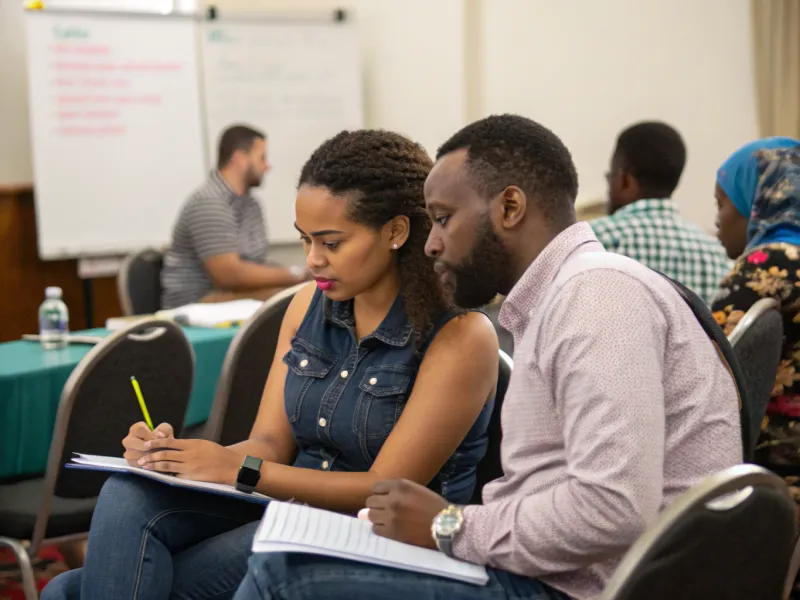30 Common Traits of Couples Who Stay Together After Infidelity

In the intricate dance of relationships, betrayal by infidelity is often considered a final step out of sync. While many believe that trust, once broken, cannot be mended, others choose a different, more challenging path: the journey to reconciliation.
These couples, who successfully navigate the stormy waters of betrayal, do not do so by accident. Rather, they share specific traits, mindsets, and recovery patterns that set them apart.
This exploration lays bare the common denominators among couples who not only survive the breach of trust but emerge stronger and, in some cases, even more connected.
1. A True Willingness to Heal

Couples who reconcile after infidelity often exhibit a genuine desire to heal and move forward. This willingness comes not from fear of being alone or comfort in what is familiar but from a place of wanting to restore what was broken. The journey is neither easy nor quick, requiring both partners to engage in honest self-reflection and open dialogue.
The healing process demands an acceptance of the past and a commitment to building a different future. This involves a lot of emotional labor, where both partners recognize that merely staying together isn’t healing. They actively work to understand each other’s pain and perspectives, fostering empathy and compassion.
Ultimately, it’s about creating a new narrative for their relationship. This willingness to heal transforms into a shared goal of growth and renewal, setting the foundation for a stronger partnership. It’s not just about patching up old wounds but creating a space where new, healthier dynamics can flourish.
2. Extreme Transparency

In the aftermath of cheating, extreme transparency becomes a cornerstone for those attempting to rebuild their relationship. This transparency isn’t just about sharing passwords or phone access—it’s about fostering an environment where honesty is the default setting. Both partners agree to remove the shadows in their relationship by actively choosing openness over secrecy.
For many couples, this means having regular check-ins where they can speak freely about their fears, insecurities, and hopes for the future. It’s about creating a space where both individuals feel safe to express their truths without judgment or retribution.
This level of transparency requires unrelenting honesty, even when it’s uncomfortable. It demands that both partners confront their vulnerabilities and work together to build trust from the ground up. By choosing transparency, they affirm their commitment to a new, more honest relationship, where secrets no longer hold power.
3. Rebuilding Trust Through Actions

Trust, once shattered by infidelity, is not easily repaired by words alone. Couples who succeed in rebuilding their relationship after cheating understand the importance of actions over promises. They recognize that trust is re-earned through consistent, trustworthy behavior over time, not just assurances.
This approach involves the partner who cheated demonstrating reliability in everyday interactions. It might be as simple as arriving home when they say they will or following through on commitments. These small, seemingly mundane actions are crucial in rebuilding a foundation of trust.
For the betrayed partner, it means acknowledging these efforts and demonstrating openness to seeing change. Rebuilding trust is a collaborative effort, requiring patience, understanding, and a shared vision for a future where both feel secure. It’s about proving, day by day, that trust can be rebuilt through tangible, consistent actions that speak louder than words.
4. Creating New Memories

Creating new memories is an important aspect for couples rebuilding after infidelity. Engaging in new experiences together helps to create a fresh narrative for their relationship, focusing on the present and future rather than the past.
This might involve trying new activities, exploring new places, or simply sharing everyday moments with renewed appreciation. These new experiences provide opportunities to bond and rediscover shared interests and joys.
By focusing on creating new memories, couples can shift their attention from past hurts to future possibilities. This practice helps to cultivate a sense of hope and excitement, reinforcing their commitment to building a life together that is enriched by shared adventures and growth.
5. Real Remorse, Not Just Regret

Real remorse differs significantly from mere regret; it’s an essential factor for couples mending their relationship post-infidelity. Regret often focuses on the consequences of getting caught, whereas remorse involves a deeper emotional acknowledgment of the pain caused to the betrayed partner.
True remorse involves empathizing with the partner’s hurt and truly understanding the impact of one’s actions. It is demonstrated through heartfelt apologies and a commitment to changing behavior. The remorseful partner actively seeks ways to atone for their actions and participates in the healing process.
This emotional sincerity helps the betrayed partner feel validated in their pain and reassured that the relationship’s restoration is a mutual priority. It’s about moving beyond lip service to genuine emotional accountability. Together, both partners can work through the aftermath with a stronger, shared purpose, using remorse as a stepping stone to deeper understanding and healing.
6. A Strong Pre-existing Foundation

Couples who manage to weather the storm of infidelity often have a strong pre-existing foundation that anchors their relationship. This foundation might include shared values, mutual respect, or a history of overcoming previous challenges together. It acts as a reminder of what makes their union worth fighting for.
This established bond provides a sense of continuity and stability, even when trust has been breached. It offers a framework within which they can navigate the complex emotions and rebuild their connection. The relationship’s history serves as a reservoir of positive experiences that can be drawn upon during difficult times.
Revisiting and reaffirming these foundational elements helps both partners recognize the relationship’s inherent value. It’s about cherishing what was good and using it as a springboard for a renewed commitment. The strength of this foundation can be a guiding force, enabling couples to reconstruct their life together with hope and resilience.
7. Emotional Honesty

Emotional honesty is a crucial trait for couples repairing their bond after cheating. This involves being truthful about their feelings, no matter how uncomfortable or painful they may be. It’s about creating a dialogue where both partners can express their emotions openly, fostering deeper understanding and connection.
Being emotionally honest requires bravery, as it often involves discussing fears, insecurities, and unresolved issues. It challenges both partners to confront emotions they might have previously avoided, promoting healing through mutual vulnerability.
For the relationship to move forward, each person must feel heard and validated in their experiences. This honesty paves the way for genuine reconciliation, allowing both to work through their emotions together. By cultivating emotional honesty, couples can build a more transparent, authentic partnership that is resilient in the face of future challenges.
8. Understanding the Reasons Behind Cheating

Understanding why the cheating occurred is a pivotal step for couples aiming to reconcile. This doesn’t mean excusing the behavior but rather exploring the underlying factors that contributed to the breach of trust. It’s a complex process that often requires introspection and, in many cases, professional guidance.
This exploration helps both partners gain clarity on what might have been lacking or overlooked in the relationship. By addressing these root causes, they can work together to strengthen their bond and prevent future issues.
For the partner who cheated, it involves acknowledging their own motivations and taking responsibility for their actions. For the betrayed partner, it means being open to understanding these reasons without blame or judgment. Together, this understanding can foster empathy, paving the way for a more informed and compassionate reconnection.
9. Reaffirming Love and Affection

Reaffirming love and affection is crucial for couples seeking to reconnect after infidelity. This involves actively expressing love and appreciation, helping to rebuild the emotional connection that was damaged.
Simple gestures like verbal affirmations, acts of kindness, or physical affection can reinforce feelings of love and security. It’s about reminding each other of the bond that still exists and nurturing it with care.
By consistently reaffirming their love, couples can create a nurturing environment where healing and reconnection are possible. This focus on love and affection helps to mend the emotional rift, allowing the relationship to grow stronger and more resilient.
10. Supportive Environment

A supportive environment plays a vital role for couples trying to rebuild after infidelity. This support system can come from family, friends, or professional counselors who encourage growth and challenge the decisions made post-betrayal.
Having people around who understand the complexities of repairing a relationship can provide much-needed encouragement and perspective. They can offer insights, share experiences, or simply be there to listen, helping the couple feel less isolated in their journey.
It’s important that these external influences remain neutral, avoiding judgment or taking sides. A balanced support system can help both partners process their emotions and reinforce their commitment to reconciliation. This environment of empathy and understanding acts as a scaffold, supporting the couple as they work through their challenges and help them build a stronger, more resilient relationship.
11. The Ability to Forgive, Not Forget

Forgiveness is an essential component for couples mending their bond after infidelity, but it’s crucial to differentiate between forgiving and forgetting. Forgiveness involves letting go of the anger and resentment that can hinder healing, while not forgetting serves as a lesson that guides future relationship dynamics.
The process of forgiving allows both partners to release negative emotions, making room for healing and growth. It’s a personal journey that can’t be rushed or forced, requiring the betrayed partner to find peace with the past.
At the same time, not forgetting ensures that valuable lessons are retained. It helps the couple avoid repeating past mistakes and encourages more mindful communication and behavior. This balance between forgiveness and remembrance enables couples to move forward with a renewed sense of trust and understanding, building a future together that is rooted in wisdom and resilience.
12. Commitment to Therapy or Counseling

For many couples, a commitment to therapy or counseling is a non-negotiable step in the reconciliation process after cheating. Professional guidance provides a safe space to explore emotions, communicate openly, and work through the complexities of infidelity.
Therapists can offer valuable insights, helping couples identify destructive patterns and develop healthier communication strategies. This shared commitment to therapy signals a willingness to invest in the relationship’s future and tackle underlying issues with the help of an objective third party.
It also provides an opportunity for personal growth, allowing each partner to reflect on their behaviors and emotions in a supportive environment. By engaging in therapy, couples demonstrate their dedication to healing and rebuilding their bond, equipping themselves with the tools needed to navigate their relationship’s challenges with renewed clarity and strength.
13. Mutual Respect

Mutual respect forms the bedrock of any healthy relationship, and it becomes even more significant when rebuilding after infidelity. Respect involves valuing each other’s feelings, boundaries, and individuality, even when emotions run high.
Couples who successfully reconcile understand that respect must be continuously fostered. It’s about acknowledging each other’s perspectives and treating one another with dignity, even amid disagreements or conflicts.
This respect is reflected in how partners communicate and support each other’s growth. By fostering an environment of mutual respect, couples can create a balanced partnership where both individuals feel valued and heard. This foundation of respect not only aids in healing past wounds but also strengthens the relationship’s resilience against future challenges.
14. Shared Goals and Vision

Couples who manage to reconcile after infidelity often discover a renewed sense of shared goals and vision for their future. This alignment is crucial as it provides direction and purpose, helping them to move forward together with clarity and intention.
By identifying common objectives, such as building a family, traveling, or achieving personal milestones, they can foster a sense of unity and teamwork. This shared vision acts as a beacon that guides their actions and decisions, strengthening their bond.
It’s important that both partners contribute to shaping this vision, ensuring that it reflects their individual dreams and aspirations. By working together towards common goals, they cultivate a partnership that is collaborative and supportive, enabling them to rebuild their relationship on a foundation of shared purpose and mutual understanding.
15. Consistent Communication

Consistent communication is a fundamental aspect for couples seeking to mend their relationship after cheating. Open, honest dialogue helps bridge the gap created by infidelity, allowing both partners to express their feelings, needs, and concerns transparently.
Regular check-ins or conversations provide opportunities to address issues as they arise, preventing the build-up of resentment or misunderstandings. Effective communication involves active listening, empathy, and a willingness to understand each other’s perspectives.
This ongoing dialogue fosters a sense of connection and trust, enabling couples to navigate challenges collaboratively. By prioritizing consistent communication, they can work through their differences and build a relationship that is more resilient, adaptable, and attuned to both partners’ needs.
16. Learning from Past Mistakes

Couples who reconcile after infidelity often show a remarkable ability to learn from past mistakes. This involves taking a candid look at what went wrong and using those insights to create a stronger, healthier relationship.
Instead of dwelling on the pain of betrayal, they focus on the lessons it offers. This might involve identifying patterns or behaviors that contributed to the issues and actively working to change them. It requires both partners to take responsibility for their roles in the relationship’s dynamics.
By learning from the past, couples can avoid repeating the same mistakes and create a more conscious, intentional partnership. This process of reflection and growth not only helps them heal but also equips them with the wisdom needed to face future challenges with resilience and maturity.
17. Accountability to Each Other

Accountability is a vital aspect for couples working to mend their relationship after infidelity. It involves both partners taking responsibility for their actions and commitments, fostering a sense of trust and reliability.
This accountability is not about blame but about owning one’s part in the relationship dynamics and actively working towards improvement. It might involve setting specific goals or actions and holding each other accountable to them.
By embracing accountability, couples demonstrate their commitment to change and growth. This mutual responsibility strengthens the partnership, creating a more trusting and dependable relationship that can withstand future challenges with resilience and understanding.
18. Emotional Support

Emotional support is a crucial component for couples working to rebuild their relationship after infidelity. It involves being present, empathetic, and understanding of each other’s emotional needs during this challenging time.
The partner who was betrayed may deal with feelings of hurt, anger, and insecurity, while the one who cheated may face guilt and regret. Both partners benefit from providing and receiving emotional support, helping each other process these complex emotions.
This mutual support fosters a nurturing environment where healing can occur. By being emotionally available to one another, couples can strengthen their bond and build a partnership that is compassionate and resilient, capable of weathering future storms together.
19. Redefining Relationship Boundaries

Redefining boundaries is a critical step for couples rebuilding after infidelity. This involves establishing new guidelines for what is acceptable and what is not, ensuring both partners feel safe and respected within the relationship.
These boundaries might include rules about communication, privacy, or time spent apart. It’s important that both partners contribute to setting these boundaries, ensuring they reflect their comfort levels and needs.
By clearly defining and respecting these boundaries, couples can create a sense of security and trust. This process empowers them to navigate their relationship with greater clarity and confidence, laying the groundwork for a more stable and balanced partnership moving forward.
20. Patience and Persistence

Patience and persistence are key traits for couples striving to restore their relationship after infidelity. The healing process is often slow and fraught with setbacks, requiring a long-term commitment to growth and improvement.
Both partners must be patient with themselves and each other, understanding that rebuilding trust and intimacy takes time. Persistence involves continually working on the relationship, even when progress seems minimal or obstacles arise.
This dedication to the relationship’s recovery demonstrates a sincere investment in its future. By embodying patience and persistence, couples can navigate the ups and downs of healing with grace and determination, fostering a partnership that is both resilient and enduring.
21. Re-establishing Intimacy

Re-establishing intimacy is a vital aspect for couples working to rebuild their relationship after infidelity. This process involves reconnecting physically, emotionally, and mentally to restore the closeness that was damaged.
It requires both partners to be open to vulnerability, sharing their desires, fears, and hopes for the future. This renewed intimacy can be nurtured through small gestures of affection, quality time together, or exploring new experiences as a couple.
The journey towards intimacy is deeply personal and varies for each couple. By focusing on re-establishing this connection, they can rediscover the joy and comfort of being close, creating a partnership that is enriched by deeper understanding and affection.
22. Flexibility and Adaptability

Flexibility and adaptability are vital traits for couples seeking to rebuild after infidelity. Life is unpredictable, and the ability to adjust to new circumstances and challenges can greatly aid in the recovery process.
For couples, this might mean being open to trying new strategies or approaches in their relationship. It involves letting go of rigid expectations and being willing to embrace change as part of their journey.
This adaptability encourages growth and allows the relationship to evolve in healthier, more dynamic ways. By being flexible, couples can navigate the twists and turns of their relationship journey with resilience, fostering a partnership that is robust and capable of withstanding whatever life throws their way.
23. Self-reflection and Personal Growth

Self-reflection and personal growth are integral to the healing process for couples recovering after infidelity. Each partner must take time to reflect on their own actions, motivations, and behaviors that contributed to the relationship dynamics.
This introspection allows for greater self-awareness and understanding, fostering personal growth that can enhance the relationship. It involves acknowledging one’s flaws and working towards becoming a better partner.
By focusing on self-improvement, individuals can bring more to the relationship, creating a more balanced and fulfilling partnership. This commitment to personal growth helps both partners to build a future together that is rooted in mutual respect and self-awareness.
24. Celebrating Small Victories

Celebrating small victories is an important practice for couples rebuilding after infidelity. Recognizing and appreciating the progress made, no matter how minor it may seem, fosters a positive atmosphere and encourages further growth.
These celebrations might involve acknowledging a successful difficult conversation, a shared moment of laughter, or a breakthrough in understanding each other. It’s about finding joy in the journey and reinforcing the strides made together.
This practice helps to build a reservoir of positive experiences that can be drawn upon during challenging times. By celebrating small victories, couples can maintain motivation and optimism, nurturing a relationship that thrives on shared accomplishments and joy.
25. Setting Realistic Expectations

Setting realistic expectations is a critical component for couples rebuilding their relationship after cheating. It involves being honest about what can be achieved and understanding that progress may be slow and nonlinear.
Both partners must communicate their expectations clearly, ensuring they align with their shared goals and capabilities. This involves acknowledging that setbacks are part of the process and focusing on the long-term journey rather than immediate results.
By setting realistic expectations, couples can navigate their healing journey with patience and understanding. This approach reduces pressure and disappointment, allowing for a more compassionate and supportive partnership that is resilient in the face of adversity.
26. Embracing Vulnerability

Embracing vulnerability is a transformative trait for couples working to rebuild their relationship after cheating. It involves being open about fears, insecurities, and desires, allowing for a deeper emotional connection.
This openness fosters trust and understanding, as both partners reveal parts of themselves that are often hidden. It’s about creating a safe space where vulnerability is not seen as a weakness but as a strength that can bring them closer together.
By embracing vulnerability, couples can build a more authentic and intimate partnership. This willingness to be seen and understood in their entirety allows for a relationship that is rich in empathy and connection, paving the way for healing and growth.
27. Balancing Independence and Togetherness

Balancing independence and togetherness is crucial for couples mending their relationship after infidelity. It involves nurturing individual identities while also fostering a strong partnership, ensuring both needs are met.
This balance allows each partner to pursue personal interests and growth, contributing to a more dynamic and fulfilling relationship. At the same time, shared experiences and goals create a sense of unity and collaboration.
By maintaining this balance, couples can support each other’s individuality while enjoying the benefits of a committed partnership. This approach fosters a relationship that is both robust and flexible, able to adapt and thrive in the face of life’s challenges.
28. Commitment to Continuous Improvement

A commitment to continuous improvement is a hallmark of couples who successfully rebuild after infidelity. This involves a dedication to ongoing learning and development, both individually and as a couple, ensuring the relationship remains dynamic and resilient.
This might involve reading books, attending workshops, or seeking advice from mentors to enhance relationship skills. This continuous growth mindset demonstrates a willingness to invest in the relationship’s future and adapt to changing needs.
By prioritizing continuous improvement, couples can foster a partnership that is ever-evolving and enriched by new insights and experiences. This dedication to growth ensures the relationship remains fulfilling and robust, capable of overcoming challenges and celebrating successes with equal enthusiasm.
29. Creating a New Norm

After experiencing cheating, creating a new relationship norm can help couples move beyond the past. This involves redefining what their partnership looks like, setting new boundaries, and establishing new routines and traditions together.
Couples often find that embracing change and innovation in their relationship helps them let go of past grievances. By consciously choosing to shape a new future, they signal commitment to each other and their shared vision.
This process of creating a new norm requires open dialogue and mutual agreement, ensuring both partners feel involved in the transformation. By doing so, couples can rebuild a relationship that is not only resilient but tailored to their evolved connection.
30. Cultivating Empathy

Empathy plays a crucial role in the reconciliation process, as understanding each other’s feelings fosters a deeper connection. Couples who cultivate empathy can navigate the aftermath of cheating with greater tenderness and patience.
Being empathetic requires active listening and putting oneself in the other person’s shoes. This nurtures a supportive environment where both partners feel heard and valued. Empathy bridges the gap between the pain of betrayal and the path to healing.
By continuously practicing empathy, couples can transform their relationship dynamics, allowing for more meaningful and heartfelt interactions. This emotional attunement is essential for rebuilding trust and moving forward together.
